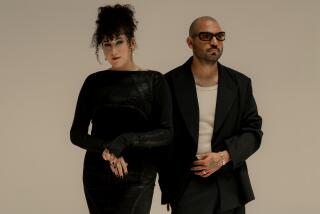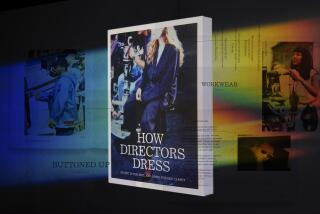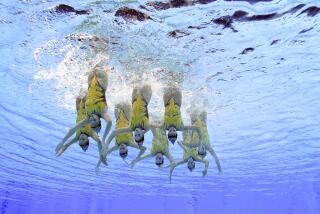Good Gottex! : Women Seeking Bold, Slimming Swimwear Make Israeli Company No. 1 in America
- Share via
TEL AVIV — A woman who’s in fabulous shape can wear any old tank suit and look terrific. Those in need of a little lifting and compressing, however, owe a debt of gratitude to Gottex.
The Israeli swimwear company takes credit for pioneering hard-cup bras, and is exceedingly generous with the Lycra (20% Lycra as opposed to the 13% to 15% used by competitors) in its fabric. Those reasons alone might easily explain why Gottex is America’s top swimsuit import.
But it is the company’s innovative styling and patterns--said to influence other swimwear manufacturers and even fashion designers--that have earned Gottex a loyal following among ordinary women, celebrities and fashion insiders.
“They have some of the most beautiful prints of any swimwear I’ve ever seen,” says Denise Scher, fashion director of the California Mart in Los Angeles.
Gottex is the top-selling bathing suit at Saks Fifth Avenue stores nationwide, according to Lynn Modrak, manager of swimwear at the Beverly Hills store. “They last forever--I see old ladies who say they’ve had their Gottex for years.”
And very young and beautiful women, such as Princess Diana, Brooke Shields and some of the models in Sports Illustrated’s celebrated swimwear issue, wear Gottex.
This year’s line of 600 styles includes ornate red and gold Chinese-looking pieces, rosebud-covered bodices with tutu-style skirts, pseudo-suede Western-style bikinis with beaded tassels, and vivid, swirling sea-green and blue Neptune designs.
But Gottex advantages don’t come cheap. Premium pieces run $88 to $150, while coordinated cover-ups, such as bicycle shorts, oversize shirts and sarongs, are priced from $100 to $250. Suits from the less expensive Viewpoint line, which is manufactured in America, sell for about $50, cover-ups for about $65.
Much of the credit for the company’s success goes to Leah Gottlieb, who is known affectionately in Israel as Lady Leah. Gottlieb founded Gottex--the name is a combination of Gottlieb and textiles --with her husband, Armin, in 1956. She remains the force behind the company’s innovative designs.
“We have a team, but I am the head,” says Gottlieb, 74, who travels the world looking for new styles and materials, and personally approves every fabric and design before it is printed at workshops at Lake Como, Italy. She counts among her influences Impressionist artists, especially Monet and Renoir, opera and ballet.
“The biggest part is persistence and bringing every year a new collection,” says Gottlieb, whose bright white office here is decorated with the prints featured in this year’s line. Her office walls are adorned with fashion awards and framed pages from Elle and Vogue featuring models with perfect bodies.
“Everything must be perfect and remain in good taste,” she says. “I’m giving from my heart in the collection.”
The issue of taste arose a few years ago when Israel’s ultra-Orthodox Jews, offended by exposure of women’s bodies, began throwing paint on bus stops bearing swimsuit ads. “We’re still on bus stops,” says Miriam Ruzow, Gottlieb’s daughter and manager of the company’s American division in New York. “We just keep (the pictures) to one-piece suits, or moderate two-pieces. And we don’t put them in Orthodox neighborhoods. We don’t want to aggravate or upset anyone.”
Another challenge facing Gottex--and other manufacturers--is the persistent threat of economic and military interruptions. Because most Israelis serve in the army one or two months a year, the factories are always 10% overstaffed. The plants employ 1,000 workers.
As big as Gottex gets, however, the headquarters will always remain in Israel, says Ruzow.
“That’s the special thing, that loyalty to Israel--to know we are indirectly helping our country,” she says. “With all the immigrants, we need to give as many people work as possible.”
*
Leah and Armin Gottlieb emigrated to Israel in 1949 as refugees from Hungary.
At the outbreak of World War II, Armin, 82, was running a raincoat factory and Leah Gottlieb was studying chemistry. When he was sent to a labor camp in Hungary, she traveled from place to place, hiding in border towns with her mother and two small children.
After receiving permission to go to Israel, the family arrived in the young country with virtually no money. Their first stop was a refugee camp in Haifa.
“We saw the sand and the cactus, and it was such a good feeling to feel the earth is ours, we are free,” says Leah. “We were newborn people.”
She pawned a sterling ring to buy fabric, and the couple began producing baby clothes. They eventually made enough money to begin manufacturing raincoats, but soon realized that Israel, with its desert climate, was not the best place for selling the slickers.
“Until 1956 and the Sinai War, there was no rain!” she says. “We looked for another article to make--we decided to remain with water, and to make swimsuits.”
Armin Gottlieb began taking their suits to small shops. He then took the suits to Canada, and a friend helped with exports to Italy.
The Gottliebs have since built Gottex into one of the world’s largest swimsuit manufacturers, one of Israel’s leading export companies, and have managed to put a country known more for border disputes than for bikinis on the international fashion map.
“I never thought we would be so big,” Leah Gottlieb says. “All my life I was not satisfied with myself--this brought out the best. But I remain what I was--simple.”
*
The business is now divided among Leah Gottlieb, who is in charge of design; her husband, who manages the local market and company finances, and their two daughters, Miriam Ruzow and Judith Gottfried. Gottfried works as president from Tel Aviv. Both daughters contribute to design.
“With the input from all of us, it makes a good salad,” says Ruzow, whose daughter works in the men’s division of Gottex in New York.
“In the family we care a lot,” she says. “We do the most we can do, and we give ourselves to the business. With your family you can get up and scream and yell. But you also have to reach a balance.”
Her father agrees. “It’s the best to work with your family,” he says from his office in the industrial section of Tel Aviv, surrounded by pictures and awards from Israeli presidents and prime ministers honoring the company for its export business. “If you want to live in peace, there is a lot you have to renounce. But in the end it works.”
This summer, Gottex will move its headquarters to a bigger building outside the city.
“When we first came here is seemed so big,” Armin Gottlieb says. “Now it’s too small.”
More to Read
Inside the business of entertainment
The Wide Shot brings you news, analysis and insights on everything from streaming wars to production — and what it all means for the future.
You may occasionally receive promotional content from the Los Angeles Times.










